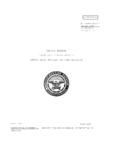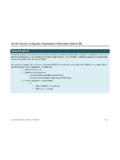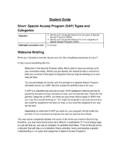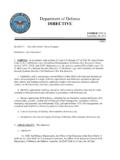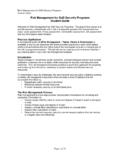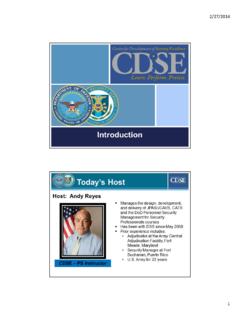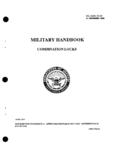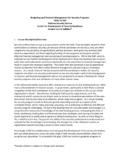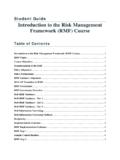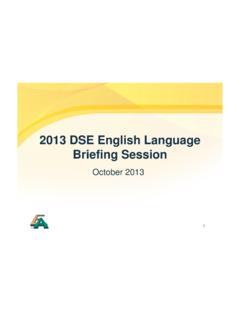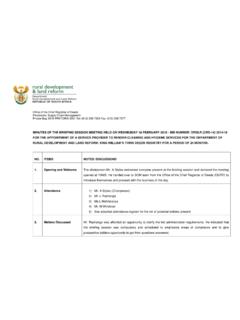Transcription of Student Guide CI Foreign Travel Briefing Short - …
1 Student Guide CI Foreign Travel Briefing Short Introduction The vacation of Joe s lifetime is right around the corner. He started planning this trip a year ago. The flight is booked, his accommodations are confirmed, and his passport is current. Everything is set. Or is it? Is Joe aware of the current security threats for his Travel destination? What about the threats to his industry? Does he have the necessary contact information in case he runs into trouble? That s where you come in. A Foreign Travel Briefing will provide Joe with the answers to these questions and more. Foreign Travel Brief How do Joe and other travelers know what to watch out for while travelling abroad? Employees should complete a Foreign Travel Briefing before departing on Foreign Travel . It is your responsibility to create and conduct this Briefing . The purpose is to: Increase awareness and personal safety while travelling internationally, increase the traveler's awareness of potential targeting by Foreign intelligence, provide information on current Travel warnings and alerts, and provide the traveler with information about where to seek assistance while traveling abroad.
2 Foreign Travel Brief Contents To assist you in creating your own Foreign Travel Briefing , let's review a sample. The Briefing includes topics on vulnerability awareness, personal safety precautions, current terrorist threat information based upon the Travel destination, who to contact if assistance is needed, and things to consider before the trip. These topics will prepare travelers for events they may encounter and arm them with the strategies needed to handle these events. Vulnerability Awareness In the Vulnerability Awareness section of the Foreign Travel Briefing , you must inform personnel that when they Travel overseas, they must be aware of the potential for danger. May 2013 Center for Development of Security Excellence Page 1 CI Foreign Travel Briefing Short Student Guide This section discusses how travelers may be targeted and how to protect against crime while traveling. In addition, travelers must know what to do if they are placed under arrest or detained by Foreign police or officials.
3 Finally, travelers must also be aware of the potential for industrial espionage and tactics that may be used against them. Personal Safety In the Personal Safety section of the Foreign Travel Briefing , you must inform personnel that it is important to maintain situational awareness. This section covers strategies for maintaining a low profile while traveling abroad. It also includes hotel safety tips and the steps needed to safeguard possessions and maintain safe accommodations. Finally, overall Travel safety should also be discussed. Terrorist Threat In the Terrorist Threat section, you must inform travelers that while they may not be able to mitigate being in the wrong place at the wrong time, there are steps they can take to minimize the threat of terrorism. This section discusses terrorist tactics and threats specific to the traveler s destinations. Travelers must be aware that they may be targeted for being an American or even being affiliated with your organization.
4 Assistance Contacts The Assistance Contacts section of the Briefing should provide travelers with guidance needed to locate contact information for the local Embassy or consulate. In addition to telephone and address, travelers should be aware of local landmarks so they may locate the Embassy in times of distress. Travelers should also maintain a list of domestic contacts. This includes contact information for their relatives, organization, financial institutions, physicians, and Travel - related government agencies, such as the Department of State. Before You Go The Before You Go section assists travelers with Travel preparations. For example, travelers should leave copies of their itineraries, passports and other important documents with family or colleagues. Travelers should also be aware of their destination s local laws and customs. They should register their Foreign Travel online with the Department of State as a safeguard in case of natural disaster or other significant event.
5 Finally, travelers should May 2013 Center for Development of Security Excellence Page 2 CI Foreign Travel Briefing Short Student Guide research current health concerns related to their destination and the immunizations needed for Travel . Foreign Travel Debrief When personnel return from Foreign Travel , you will conduct a debrief session with them. Depending upon the purpose and destination of the Travel , this debrief may be as informal as a questionnaire or as formal as an interview. Regardless of format, the purpose is to determine if anything happened during the trip that raises a concern. There are several content areas that are recommended. While this is not an exhaustive list of topics that could be covered, it is designed to Guide the traveler to determine if and where any possible suspicious activity occurred. Take a moment to review the list of recommended topics: Countries and dates visited Irregularities at entry Gifts or provisions received Foreign inquiries Requests received Unexpected or unusual events Suspicious Foreign contacts.
6 Reporting Suspicious Activity Personnel are required to report any suspicious Foreign contacts and suspicious activity that occurs during Foreign Travel . Direct personnel to report to their local security contact. Reporting is essential so that threat information can be consolidated and larger threats may be identified. Activity You will now have the opportunity to create a CI Foreign Travel Brief for your organization or company. For this activity, Microsoft PowerPoint software needs to be installed on your computer. From within the courseware, select the file " Foreign Travel Brief Template" to open a copy on your local machine. Then save a copy using the "Save " option. Now you are able to add in the information necessary for your personnel and their Foreign Travel plans. The contents of the " Foreign Travel Brief Template" are included in Appendix A of this Student Guide . May 2013 Center for Development of Security Excellence Page 3 CI Foreign Travel Briefing Short Student Guide Summary Foreign Travel briefings help prepare travelers for events they may encounter, and arm them with the strategies needed to handle these events.
7 You had the opportunity to modify a sample CI Foreign Travel Briefing specific to your organization. This will help personnel in your organization when they Travel abroad. The contents of the CI Foreign Travel Briefing are included in Appendix A of this Student Guide . The additional Foreign Travel information from the DSS CI Directorate is included in Appendix B of this Student Guide . May 2013 Center for Development of Security Excellence Page 4 CI Foreign Travel Briefing Short Student Guide Appendix A: Foreign Travel Brief Template May 2013 Center for Development of Security Excellence Page 5 [Your Organization] Foreign Travel Briefing Agenda Vulnerability Awareness Personal Safety Terrorist Threat Information Assistance Contacts Before You Go Vulnerability Awareness In this section, you will learn about: How you may be a target Crime targeting Foreign travelers Foreign arrest and detention Industrial espionage tactics When travelling abroad, you must know how to protect yourself and safeguard your belongings.
8 How You May Be a Target: What You Know You may possess or have access to information that is highly sought after by Foreign entities, including: Friendly information Research, development, testing, and evaluation Program milestones and specifications System capabilities Foreign entities also target information related to your organization s personnel, security, and operations. You are the first line of defense in protecting classified information and defense technologies! Counterintelligence What is Counterintelligence? Information gathered and activities conducted to identify, deceive, exploit, disrupt, or protect against: Espionage Other intelligence activities Sabotage Assassinations Conducted by, for, or on behalf of: Foreign powers Foreign governmental and commercial organizations Foreign persons or their agents International terrorist organizations CI Awareness and Foreign Travel Foreign Travel increases the risk of Foreign intelligence targeting. Collection techniques include, but are not limited to: Bugged hotel rooms or airline cabins Intercepts of email and fax transmissions Tracking activity via ATM transactions and Internet usage at Internet kiosks and Wi-Fi access points Recording of telephone conversations Unauthorized access to or theft of electronic devices and installation of malicious software at customs or hotel Intrusion into or search of hotel rooms and hotel room safes Enhanced interviews by customs officials Identifying Suspicious Contacts Examples of suspicious contacts include, but are not limited to.
9 Requests for protected information under the guise of a price quote or purchase request, market survey, or other pretense Foreign entities targeting personnel travelling overseas via airport screening or hotel room incursions Attempts to entice personnel into situations that could lead to blackmail or extortion Attempts by Foreign customers to gain access to hardware and information that exceeds the limitations of the export licenses on file Attempts to place personnel under obligation through special treatment, favors, gifts, or money What To Do If Approached If you feel you are being solicited for information: Practice authorized responses to questions concerning your duties Never feel obligated to answer questions which make you feel uncomfortable If a conversation is too probing with respect to your duties, private life, and co-workers, change the subject Be observant and take note of the person questioning you Maintain professional composure REPORT, REPORT, REPORT: Provide as much information as possible to your security point of contact Foreign Travel and Crime Crime is one of the biggest threats facing travelers.
10 Crimes against travelers are crimes of opportunity. Follow these steps to protect yourself: Stay alert and exercise good judgment When possible, ensure that your hotel room has a peephole and a deadbolt lock or a chain-and-slide bolt If you Travel with valuables, put them in the hotel safe Find out what parts of town locals consider risky and avoid them Keep your car doors locked and suitcases out of sight If you see an accident, don't stop; instead, call for help from a safe area Minimize the amount of cash you carry Be wary of street vendors and innocent-looking youngsters as they may be decoys for pick pockets Foreign Arrest and Detention Foreign police and intelligence agencies detain persons for many reasons, including simple curiosity. If you are detained or arrested for any reason: Exercise good judgment and be professional in your demeanor Stay calm, maintain your dignity, and do not do anything to provoke the arresting officer Ask to contact the Embassy or Consulate DO NOT admit to anything or volunteer any information DO NOT sign anything until the document is examined by an attorney or an embassy/consulate representative DO NOT accept anyone at face value: Request identification from embassy/consulate representatives DO NOT fall for the ruse of helping the ones who are detaining you in return for your release Local Laws While travelling, remember that you are subject to the local laws.
